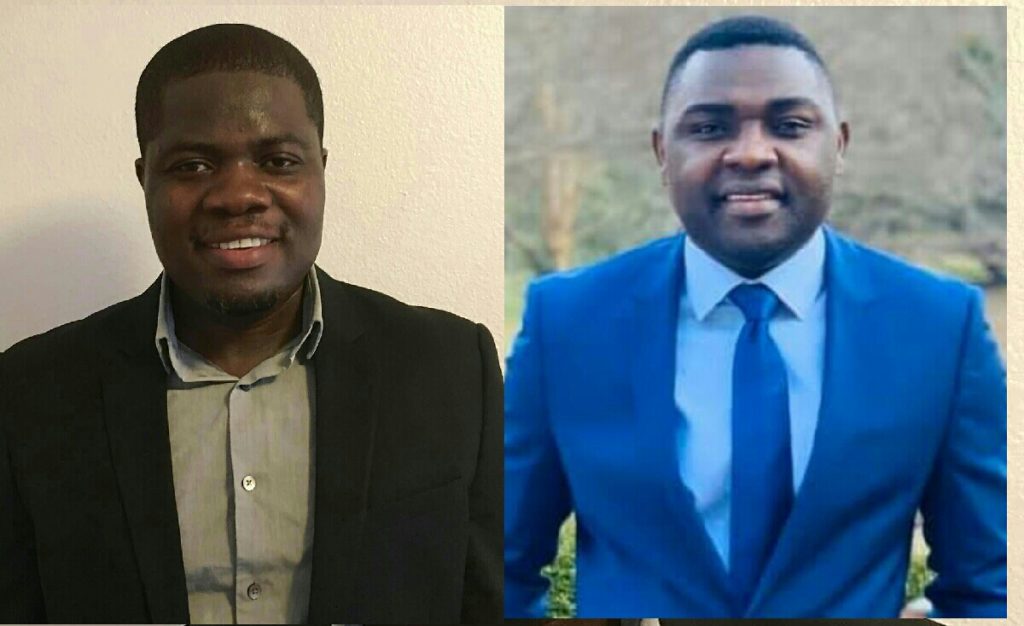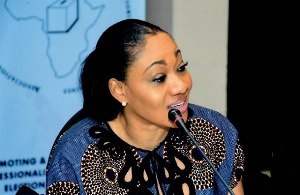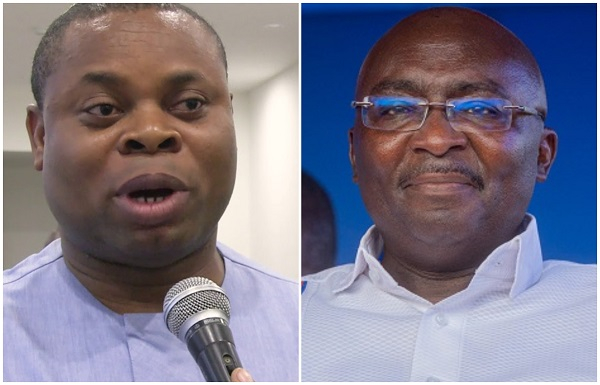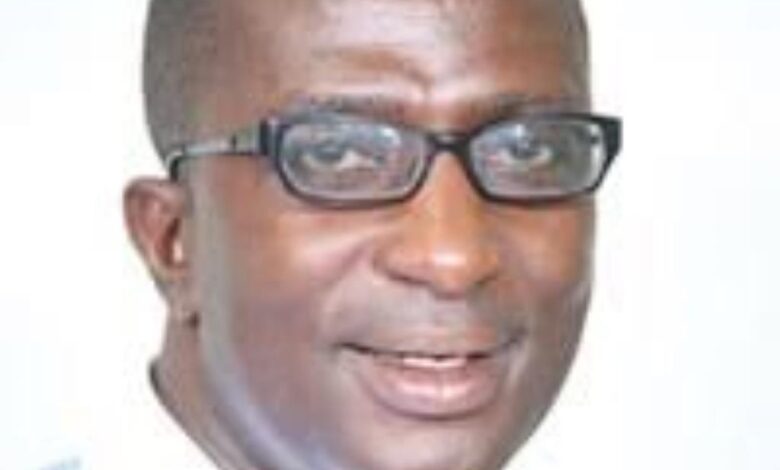POLITICS
Election 2020 : Full Text of Concerned Ghanaians Press Conference in Washington DC, USA

Fellow Ghanaians, invited press, ladies and gentlemen, good afternoon and welcome to the Capitol Hill in Washington DC. We are grateful to each of you for honoring our invitation. The purpose of this event is to create awareness for the world leaders and the international community to punctiliously monitor the upcoming presidential and parliamentary elections in Ghana. We believe that this action will help to avoid any potential violence before, during and after the elections.
Mrs. Jean Adukwei Mensah, the current Electoral Commissioner (EC) was appointed by the incumbent President, Nana Akufo Addo in August of 2018, after terminating the appointment of the immediate past Electoral Commissioner. Tensions are already brewing in the country in anticipation of the forthcoming elections due to the following:
– electoral infractions created by Mrs. Jean Adukwei Mensah
– her mishandling of the voters registration exercises
– the EC’s questionable disqualification of five (5) independent presidential candidates
– and several allegations levelled against the current EC leadership
Ladies and gentlemen, elections are the cornerstone of Ghana’s democracy and they have strengthened the nation’s peace under Ghana’s 4th Republic. The flaws on the part of the EC have created inconsistencies in the fundamental link between the trust in election infrastructure and the confidence that Ghanaians place in basic democratic function. These irregularities have raised serious red flags concerning the credibility and transparency of the upcoming presidential and parliamentary elections.
International observers from the UN, EU, AU and ECOWAS who will be monitoring the elections in Ghana should expect the following electoral malpractices and hence, should put measures in place prior to the elections:
1. Intimidation: During the Ayawaso West Wuogon by-election in Accra in 2019, supporters of the major opposition party reported acts of intimidation to prevent them from going out to vote. There is video footage of the youth wing of the incumbent political party using guns and police vehicles to intimidate and threaten community members who support other political parties in their community, ahead of the elections. In addition, the Deputy General Secretary of the incumbent political party, Nana Obiri Boahen has declared a dispatch of more soldiers during the upcoming elections, instead of policemen who are primarily responsible for overseeing election security in Ghana.
2. Disenfranchisement: During the new voters registration exercise this year, armed men in uniform, purported to be National Security operatives were dispatched to strongholds of the major opposition party to prevent Ghanaian citizens from exercising their fundamental rights of acquiring voter ID cards. There were rampant gunshots, brutalities and chaos. In addition, we are reliably informed that names of some security officers have been removed from the voters register.
3. Rigging: Again, during the voters registration, the electoral commission deliberately announced bigger numbers than the actual figures in some of the incumbent party’s strongholds. The commission made the necessary corrections only after Ghanaians in those constituencies challenged the figures with evidence.
Ladies and gentlemen, the current EC and her team upon assumption of office decided to ignore the inputs from the Inter-Party Advisory Committee (IPAC), which is an important mechanism in the country’s electoral system. This committee serves as an advisory body to Ghana’s electoral commission to manage distrust in the electoral system. It consists of representatives from all the political parties in Ghana. Other members who serve as observers in the IPAC include representatives from the Civil Society Organizations (CSOs) and the donor community. Let me give a brief history about the IPAC.
Brief History About the Inter-Party Advisory Committee (IPAC)
As part of the constitutional democratic dispensation programme to transition from military to civilian rule, presidential elections were held on November 3, 1993. The National Democratic Congress (NDC), which emerged from the military Provisional National Defence Council (PNDC) under the leadership of the late Flt. Lt. Jerry John Rawlings won the election. Unfortunately, the opposition political parties, including the New Patriotic Party (NPP), People’s National Convention (PNC), National Independence Party (NIP) and People’s Heritage Party (PHP), boycotted the parliamentary election which was scheduled to be conducted on December 8, 1992.
The opposition parties took this decision after complaining about widespread rigging, electoral irregularities, intimidations and harassments of the opposition party members in the presidential elections. They later expressed their willingness to take part in the political process outside the parliament. Because there had not been a workable and effective parliament in Ghana since 1981, after the PNDC assumed office, the international community and the CSOs advocated for electoral reforms to address the challenges encountered during the 1992 elections. IPAC was then formed in March 1994.
To consolidate Ghana’s democracy for future success, there was the need to institutionalize dialogue and consultation as the means for political parties to express their grievances to the electoral commission for appropriate actions to be taken accordingly. This is the reason why IPAC was established as a committee to discuss and build consensus on policies relating to electoral matters before their implementations. There have been several electoral reforms after the 1992 elections to ensure free, fair and transparent elections. Some of the reforms included:
• Changing from opaque to transparent ballot boxes
• Addition of photos on voters ID cards.
• Voting of presidential and parliamentary elections on the same day.
• Declaration of polling station results on the same day.
• Adoption of biometric voters registration system.
Currently, the attitude of the EC and her team towards IPAC has made opposition political parties lose trust in the electoral infrastructure in Ghana. The EC insists that the electoral commission is an independent body and hence, does not need input from the committee members before implementing new policies under her authority. Mrs. Jean Mensah and her team call for IPAC meetings just to announce decisions they intend to carry out without necessarily seeking the opinions of IPAC members. This attitude has led to various flaws in our current electoral system. We would like to elaborate on a few electoral problems under the leadership of Mrs. Jean Mensah.
Ayawaso West Wuogon By-Election Incident
Subject to Ghana’s constitutional provision on the replacement of a legislator after death, a by-election was conducted on January 31, 2019 to replace the late Member of Parliament (MP), Emmanuel Kyeremanteng Agyarko after he passed away on November 21, 2018. Two hours after the beginning of the election, masked men portrayed to be National Security operatives physically attacked and shot at voters at the La-Bawaleshie polling station. During the violence, an MP was assaulted alongside 18 Ghanaians.
Ladies and gentlemen, the President of the Republic of Ghana, President Nana Akufo Addo set up a committee to investigate the incident and the committee successfully completed the assignment with some recommendations. Unfortunately, the president and his team subsequently issued a white paper to annul the punishments to be faced by the perpetrators involved in the attacks. This action by the president emboldened the repeated incidents of chaos during the new voters registration process. There is an indication that these perpetrators will repeat the same action across the whole country during the upcoming elections.
Gunshots, Murder, Brutalities and Injuries During the Voters Registration Process
Before the assumption of the current EC into office, there was a credible biometric voter register which was successfully used to conduct the 2012 elections to elect former President John Mahama and the same register was updated to elect the current President, Nana Akufo Addo. Surprisingly, Mrs. Jean Mensah and her team decided to compile a new register in 2020 and all efforts by Ghanaians to stop the process proved futile. There were widespread reports of intimidations, frustrations, harassments, gunshots, brutalities and deaths caused by similar groups of individuals who created havoc during the by-election in 2019. Some of the unfortunate incidents included the following:
A murder case at Banda in the Bono Region, where a young teacher perceived to be a member of the major opposition party was killed during the registration process.
A murder case at Nkrankwanta, where a man believed to be a member of the major opposition party was killed during the registration process.
Gunshots, injuries and near fatal attacks on the Asutifi South constituency MP, Alhaji Collins Dauda who belongs to the major opposition party.
Gunshots, injuries and near fatal attacks on the Ejura Sekyeredumasi constituency MP, Alhaji Mohammed Bawa who also belongs to the major opposition party.
In addition to the heinous crimes listed, there were several open displays of weapons and physical assault on people residing across the country. The purpose of these actions was to scare the people and prevent them from registering to vote on the election day. Some of the incidents included the following:
Gunshots fired by the current Minister for Special Initiatives and Developments, who doubles as the MP for Awutu Senya East constituency, Mavis Hawa Koomson.
Gunshots, brutalities, harassments and intimidations at Tano South constituency, Ejumako Enyan constituency and harassments and Ketu South constituency.
Some of the perpetrators were arrested and Ghanaians were looking forward to their prosecutions. Surprisingly, all them were freed by the police and none of them were arraigned before the law court, including the sitting Minister who fired the gunshots at the voters registration center. Based on the examples given, Ghanaian voters have decided to protect themselves during the election day, as they believe the government has been unable to protect the good people of Ghana.
Typical Discrepancies Created by the Electoral Commission.
During the voters registration process and the exhibition of the register, there were widespread reports of obvious infractions caused by the electoral commission. Ghanaians who do not support the incumbent government believe that these deliberate mistakes were attempts to prepare a victory ground for the incumbent president to win the presidential election at all costs. Some of the flaws included:
Duplication of biometric ID cards.
Mismatch of names and ID numbers in the voters register in major opposition strongholds.
Missing names from the registration list in strongholds of the major opposition party.
Deletion of more than 30,000 names from the voters register without publishing the list of the affected people and why they were deleted.
These shortcomings of the electoral commission in addition to the intimidations, harassments and, brutalities are creating serious political tensions across Ghana. Furthermore, the major opposition leader and Ex-President has vowed to reject any flawed election results. The probability of civil unrest in Ghana is high and the time for the international community to intervene is now.
After careful analysis of the flawed electoral preparation as well as the current EC’s posture in carrying out partisan duties, we are concerned about electoral misconduct and violence during the December 7th elections in the country. The Concerned Ghanaians Group therefore requests that the world leaders, the international community and the donor community should empower the election observers from the UN, EU, AU and ECOWAS to closely monitor the upcoming elections in Ghana. Ghana’s electoral accomplishments in the past have made the country an exemplar of good governance and peace in Africa. We are here to take this action today to help safeguard the peace and stability of our dear nation. God bless our homeland Ghana! God bless Africa!
Thank you.
Solomon K. A. Owusu, Ph.D.
Group’s Spokesperson
Denver, Colorado, USA
Source: Thepressradio.com/Dickson Boadi





